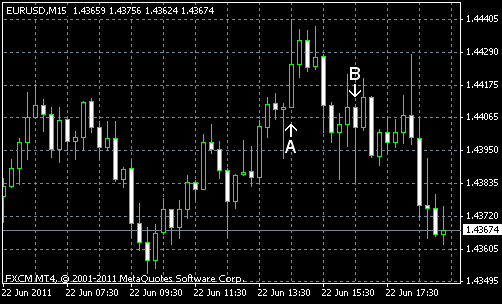- December 21, 2020 Do we get tax benefits on Personal Loan?
- December 18, 2020 The solicitors Preston depends on for stress-free compensation claims
- December 16, 2020 eToro: History and Key Features
- December 11, 2020 Canadian Dollar Pauses 2020 Rally Against US Peer Amid Falling Crude Prices
- December 11, 2020 Pound Crashes Against Dollar As No-Deal Brexit Appears Imminent
- December 11, 2020 USD/JPY 104.57 High Starting a New Bearish Leg?
Day: June 22, 2011
 June 22
June 222011
Fed Keeps Rates Unchanged, Dollar Rises vs. Euro on Greece
The US dollar gained today versus the euro as the impact of the situation in Greece outweighed the dovish statement of the Federal Open Market Committee. The FOMC kept the main Federal Funds Rate near zero and said in its statement: The Committee continues to anticipate that economic conditionsâincluding low rates of resource utilization and a subdued outlook for inflation over the medium runâare likely to warrant exceptionally low levels for the federal funds rate for an extended period. The Committee will […]
Read more June 22
June 222011
Euro Falls After Confidence Vote
The euro dropped today even after Greece’s Prime Minister George Papandreou won the confidence vote as traders think that he’ll struggle to implement austerity measures. Jeremy Stretch, the executive director of foreign-exchange strategy at Canadian Imperial Bank of Commerce, said: Markets are refocusing on the fact that the euro zone has dodged the bullet in terms of the confidence vote, but now we are looking forward to the austerity vote. Whether the response […]
Read more June 22
June 222011
Pound Falls as Minutes Signal About More Stimulus
The Great Britain pound dropped today as the minutes of the Bank of England monetary policy meeting showed that most of the policy makers voted to keep lending rates unchanged and suggested that further easing may be possible. Seven of the Monetary Policy Committee members voted to keep the rates stable, while only two voted for an increase. On the previous meeting three members voted for higher interest rates. The minutes said that “the current weakness […]
Read more June 22
June 222011
EUR/USD Weak Even After Fed Maintained Stimulus
EUR/USD rose today after Greece’s Prime Minister won a confidence vote, but erased gains on the speculation that the Greek government will struggle to implement austerity measures, which are very unpopular among Greece’s population. The currency pair remained weak even after the US central bank maintained the interest rates and signaled that it will continue to stimulate the US economy. EUR/USD trades near 1.4364 after rising […]
Read more June 22
June 222011
Kiwi Fluctuates, Can Become Stronger on Current Account
The New Zealand dollar fluctuated today after it rose yesterday as the nation’s current account deficit shrank more that was predicted by economists. The New Zealand current account deficit (seasonally adjusted) decreased by $1.1 billion from the fourth quarter of 2010 to $1.8 billion in the first three month of 2011. The net international liabilities fell by $10.4 billion from Q4 2010 to $148.2 billion in March quarter of 2011. The kiwi, as the New […]
Read more